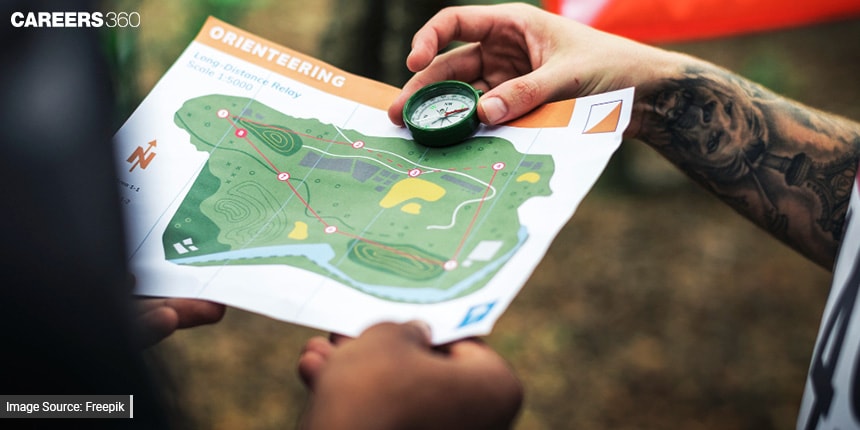Orienteering: An Unconventional Sport That Enhances Navigation Skills And Promotes Outdoor Adventure
Orienteering is an outdoor activity where participants use maps and compasses to navigate through unfamiliar terrain, aiming to locate a series of checkpoints in the shortest time. Participants, known as orienteers, use their map-reading and problem-solving skills to locate the markers, also known as controls, scattered across the course. It is a mentally stimulating as well as a physically challenging activity that combines elements of running, hiking, and exploration. It is an inclusive sport that welcomes people of all ages and fitness levels. From young children to senior citizens, everyone can participate and enjoy the thrill of navigation and discovery.

As an educational activity, orienteering is highly beneficial for young learners. It develops essential life skills such as decision-making, independence, and self-confidence. Orienteers learn to trust their instincts and navigate through challenges, enhancing their problem-solving abilities both on and off the course.
Also Read | 5 Movies That Will Help Child Accept The Life At A Residential Schools
The origins of orienteering can be traced back to Sweden in the late 19th century. It started as a military training exercise to improve soldiers' navigational skills, but it quickly evolved into a recreational activity. Today, orienteering is practised worldwide, with enthusiasts of all ages and abilities engaging in this exhilarating pursuit. One of the key attractions of orienteering is the mental challenge it presents. For children, orienteering offers a plethora of benefits that contribute to their overall development.
Problem Solving and Quick Decision Making
Orienteering offers numerous mental benefits. Orienteers quickly interpret maps to plan efficient routes, make real-time decisions amidst obstacles, and develop spatial awareness. This improves problem-solving, critical thinking, and concentration, even while the players review their performance for continual improvement. Through this process, orienteers develop and sharpen their problem-solving skills, which are valuable assets both in the sport and in various aspects of life. Orienteering thus provides a unique avenue for individuals to develop and sharpen their problem-solving acumen in an exhilarating and challenging setting.
Navigation Skills
Orienteering is an excellent activity to improve navigation skills as it involves using maps and compasses to navigate through unfamiliar terrains and find specific checkpoints. Participants engage in map reading, compass use, and route planning, enhancing their ability to navigate through unfamiliar terrains and challenging conditions. Regular practice during orienteering events hones their map interpretation, dead reckoning, and orientation skills, making it an enjoyable and effective way to develop this essential skill.
Love for Nature and Exploration
Orienteering's reliance on natural settings and outdoor exploration nurtures a profound love for nature and a sense of adventure in its participants. As they navigate through the diverse landscapes, orienteers develop a deep connection with nature, fostering an appreciation for its beauty, complexity, and importance in their lives. This newfound love for nature and exploration extends beyond the sport, inspiring individuals to embrace and protect the natural world around them.
Also Read | Power Of Pranayamas And Asanas In Student Life
Communication and Teamwork
Orienteering is a social activity that promotes teamwork and communication. It is often done in groups or teams, requiring participants to collaborate and support each other in finding the controls. It promotes effective and clear communication, division of tasks, and conflict resolution. Orienteering experiences build trust, encourage leadership development, and strengthen team bonding through debriefing and feedback, making it an ideal platform for developing essential communication and teamwork skills.
Physical Fitness
Since it is an outdoors game, orienteering improves fitness levels. Orienteers cover long distances on foot, running or walking, to locate all the control points. This physical activity improves cardiovascular health, endurance, and overall fitness. As a non-competitive recreational activity, orienteering offers an excellent way to stay active and engage with the natural environment. By combining cardiovascular exercise, muscular strength training, balance, and coordination, orienteering helps individuals improve their overall physical health and well-being.
Self-Confidence and Self-Reliance
Orienteering's challenging nature empowers participants with a sense of accomplishment, boosting self-confidence and self-reliance. Successfully completing courses fosters belief in their abilities, while independence, resilience, and adaptability in uncertain situations enhance their confidence. Embracing challenges and learning from mistakes build competence and a willingness to tackle new tasks, all contributing to greater self-assurance and self-reliance.
Also Read | 5 Olympic Sports That Young Kids Can Train In
Orienteering is much more than just a sport, it is a holistic experience that nurtures the mind, body, and spirit. As participants embark on a journey of navigation and adventure, they gain valuable skills, a deeper connection with nature, and a sense of camaraderie with fellow orienteers. Whether a beginner or an experienced orienteer, this thrilling sport offers an extraordinary way to explore the world and embark on a lifelong journey of discovery.
Applications for Admissions are open.
As per latest syllabus. Physics formulas, equations, & laws of class 11 & 12th chapters
JEE Main Important Chemistry formulas
Get nowAs per latest syllabus. Chemistry formulas, equations, & laws of class 11 & 12th chapters
JEE Main high scoring chapters and topics
Get nowAs per latest 2024 syllabus. Study 40% syllabus and score upto 100% marks in JEE
JEE Main Important Mathematics Formulas
Get nowAs per latest syllabus. Maths formulas, equations, & theorems of class 11 & 12th chapters
